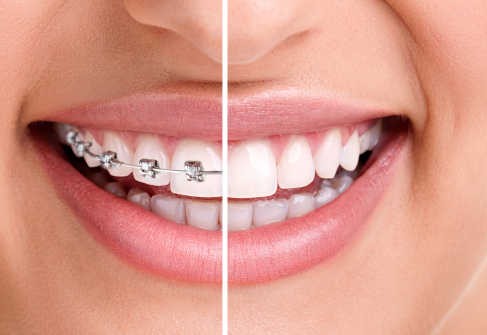Braces are an orthodontic treatment that is used to properly correct various teeth disorders, such as misaligned teeth, overbite, underbite, and overcrowding. According to the dentist, braces are an effective treatment for these teeth problems but teeth can easily develop cavities, sensitivity, stains and gum problems as well while braces are on.
For the braces to be very effective and correctly provide the best results, they require proper care and maintenance.
This is why it’s very important to know how to maintain good Oral hygiene with orthodontic braces.
In this article, we will give some helpful advice on how to maintain your braces.
1: Brush your teeth regularly
Braces create spaces where food particles can accumulate or hang, making it difficult to maintain good oral hygiene. It is important to spend two minutes brushing your teeth twice a day, especially after meals. While brushing your teeth with soft-bristled and fluoride toothpaste, move gently in a circular motion around the brackets and wires, including the gum line, to properly remove any food particles and plaque.
You can brush with an electric toothbrush too, if you prefer it with a normal toothbrush.
2: Floss daily
Flossing while wearing braces can be challenging and stressful but it’s good for your Oral hygiene routine. Flossing helps to remove any food debris or particles that are stuck between the wires and brackets. These food particles between and around the orthodontic wires and brackets can cause tooth discolouration, stains or cavities.
Using dental floss and interdental brushes can make it easier to get between your teeth and around braces but are they enough? No, we always advise using water flossers in addition to brushing and interdental brushes.
3: Water Flosser
A water flosser is an oral health care device that uses a stream of water to remove stubborn food particles and plaque from teeth, around the brackets and gum lines. Water flosser shouldn’t be an alternative to flossing or interdental brushes, but a compulsory add-on as it is a great device for your oral hygiene routine.
Water flossers are very effective for braces patients as they can enter hard-to-reach areas where toothbrushes and floss failed to reach.
4: Wear a mouthguard while playing sports
You are to wear a mouthguard to protect your braces from damage if you are into sports or other physical activities.
Since you wear mouthguards in your mouth to protect your braces, they are prone to bacteria buildup, discolouration and dull appearance as well.
Cleaning your mouth guard with an Ultrasonic Retainer Cleaner or Mouthguard cleaner will prevent bacteria growth, discolouration and cloudy or dull appearance
5: Avoid hard, sticky, and sugary foods
Eating hard, sticky, or sugary foods while wearing braces can easily damage your braces and increase your treatment time. What do hard, sticky and sugary foods do to your braces? Hard or sticky foods such as popcorn, corn, Apple, Carrots and chewing gum can dislodge the brackets or bend the wires, while sugary foods can cause tooth decay. You should choose soft and healthy foods that are easy to chew and won’t remove your brackets or bend the wire.
6: Avoid biting or chewing hard objects
While wearing braces, you should avoid biting your nails, chewing on pens or pencils, or using your teeth to open packets or as a bottle opener. These habits can damage your braces, remove brackets and prolong your treatment time.
7: Attend all your orthodontic appointments
Regular orthodontic appointments as given by your orthodontics are very important and should not be skipped if you want a faster and better outcome. Tooth movements occur while wearing braces, so during these appointments, your orthodontist will make any necessary adjustments and monitor your progress.
8: Orthodontic wax
If you are wearing braces, you may experience some discomfort and irritation on your lips, cheeks and gums. Applying a small amount of orthodontic wax to the brackets or wires can help relieve this discomfort and irritation.
Conclusion
Taking care of your braces requires a combination of proper oral hygiene, healthy habits, and regular orthodontic appointments.
The use of electric toothbrushes and water flossers can be an effective tool for braces patients to maintain their oral hygiene. By using these tools and following these tips, you can ensure that your braces function correctly and provide you with the best possible results.

